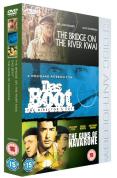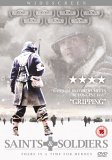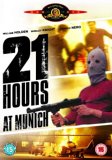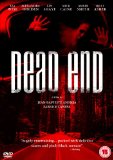![Sisterhood [1988]](/pictures/1029326.jpg) Sisterhood | DVD | (22/10/2001)
from £16.16
| Saving you £-3.17 (-24.40%)
| RRP
Sisterhood | DVD | (22/10/2001)
from £16.16
| Saving you £-3.17 (-24.40%)
| RRP In the violent new dark age of the year 2021 all women are helpless slaves of a brutal male-dominated society: all women that is except the deadly and gifted maidens of 'The Sisterhood'...
![The 7th Dawn [Blu-ray]](/pictures/1157915.jpg) The 7th Dawn | Blu Ray | (11/01/2022)
from £N/A
| Saving you £N/A (N/A%)
| RRP
The 7th Dawn | Blu Ray | (11/01/2022)
from £N/A
| Saving you £N/A (N/A%)
| RRP ![Fantastic Four [UMD Mini for PSP]](/pictures/1081844.jpg) Fantastic Four | UMD | (07/12/2007)
from £N/A
| Saving you £N/A (N/A%)
| RRP
Fantastic Four | UMD | (07/12/2007)
from £N/A
| Saving you £N/A (N/A%)
| RRP ![Lansky [1999]](/pictures/1019437.jpg) Lansky | DVD | (17/02/2003)
from £9.98
| Saving you £-3.99 (N/A%)
| RRP
Lansky | DVD | (17/02/2003)
from £9.98
| Saving you £-3.99 (N/A%)
| RRP Meyer Lansky was an enigma. Few knew him. Many feared him. He was passionately loyal to his friends and ruthless towards his enemies. He was calm and calculating. He seemed above reproach. Lansky is based on the true story of a young Jewish immigrant from Poland who grew up on the impoverished streets of the Lower East Side of New York at the turn of the 20th Century. Turning his back on poverty Lansky (Richard Dreyfuss) embarked on a life of crime. He monopolised racketeering bootlegging gambling and organised crime with a keeness of mind and shrewdness never before seen. Partnered with his childhood friend Ben Bugsy Siegel (Eric Roberts) and young Italian street thug Charlie Lucky Luciano (Anthony LaPaglia) Lansky earned notoriety that eventually made him the object of several FBI investigations and congressional hearings. Directed by John McNaughton this HBO production is a fascinating tale of loyalty and deception innocence and guilt crime and murder.
![The X-Files: The Truth [2002]](/pictures/1029228.jpg) The X-Files: The Truth | DVD | (27/01/2003)
from £21.58
| Saving you £-5.59 (N/A%)
| RRP
The X-Files: The Truth | DVD | (27/01/2003)
from £21.58
| Saving you £-5.59 (N/A%)
| RRP The guest cast list for The X-Files: The Truth runs almost to the first commercial break, suggesting how many plot strands this season-and-series finale needs to make room for, with many old characters (including ghostly appearances for the dead ones) popping up. Mulder (David Duchovny), teasingly absent for the final season, is suddenly back, accused of murdering a super-soldier who isn't supposed to be able to die. He faces a military tribunal, defended by AD Skinner (Mitch Pileggi), as guest stars trot out testimony that fills the double-length episode with explanations recapping nine years of confusion as creator Chris Carter tries to spatchcock his impromptu conspiracy theories into a real plot. Last-season regulars Robert Patrick and Annabeth Gish are shunted aside as Scully (Gillian Anderson) and Mulder get to dodge a last-scene explosion and wind up in a pretty silly clinch-with-philosophy in the face of vaguely imminent apocalypse. Seriously, if the franchise is to continue on the big screen, how about ditching the embarrassing alien conspiracy mess and doing a monster story? On the DVD: The X-Files: The Truth comes to disc with a lovely widescreen transfer, a 13-minute "Reflections on the Truth" featurette that, though it hits the self-congratulation button a couple too many times, has a little more meat than the puff pieces included on previous releases, and a bonus episode ("William") that is unfortunately another of the maudlin ones, this time resolving the plotline about Scully's super-baby. --Kim Newman
 The Bridge on the River Kwai/Das Boot/The Guns of Navarone | DVD | (02/10/2006)
from £N/A
| Saving you £N/A (N/A%)
| RRP
The Bridge on the River Kwai/Das Boot/The Guns of Navarone | DVD | (02/10/2006)
from £N/A
| Saving you £N/A (N/A%)
| RRP Bridge Over The River Kwai: Set in Burma during World War II the story tells of British P.O.Ws who are forced to build a large bridge for the Japanese while a British Commando team is sent to destroy it. Winner of seven Academy Awards. (Dir. David Lean 1957) Das Boot: Das Boot is a graphic and gripping tale that follows the daring patrol of U-96 one of the famed German U-Boats known as 'The Grey Wolves'. Prowling the North Atlantic they challenged the British Navy at every turn. The crew abroad the U-96 is portrayed in a desperate life-and-death struggle coping with life beneath the waves quickly gives way to terror when confronting the enemy... (Dir. Wolfgang Peterson 1981) The Guns Of Navarone: Exciting war film based on a novel by Alistair Maclean which tells of the attempts of a British raiding team to sabotage two giant German guns on a Greek island in the Aegean Sea. Carl Foreman brought Allistar MacLean's best-selling novel to the screen winning nominations for seven Academy Awards in 1961. (Dir. J. Lee Thompson 1961)
 Saints And Soldiers | DVD | (09/01/2006)
from £4.85
| Saving you £11.14 (229.69%)
| RRP
Saints And Soldiers | DVD | (09/01/2006)
from £4.85
| Saving you £11.14 (229.69%)
| RRP There is a time for heroes... Belgium: December 1944 and German troops open fire on unarmed American prisoners of war provoking the historic Malmedy Massacre. Four soldiers trapped behind enemy lines discover a stranded R.A.F. pilot who holds the key to German intelligence which could save thousands of American lives. The five men must battle through the bitter Winter landscape to smuggle their precious cargo from the clutches of the enemy.
![Expect No Mercy [1995]](/pictures/1003702.jpg) Expect No Mercy | DVD | (04/03/2002)
from £7.33
| Saving you £-3.34 (N/A%)
| RRP
Expect No Mercy | DVD | (04/03/2002)
from £7.33
| Saving you £-3.34 (N/A%)
| RRP Federal Service Agent Justin Vanier has been assigned to infiltrate the Virtual Arts Academy in search of another operative Eric. In this high-tech facility controlled by Warbeck a new generation of assassins trains for actual killings in a virtual reality arena. Penetrating the organization as a new recruit Justin finds Eric and joins forces with the idealistic Vicki. Together they must bring down Warbeck before another assassination is committed. Combatting holographic programs of limitless power Justin and Eric combine their skills to escape the computer generated world and confront Warbeck in an explosive battle where the pain is very real.
![Dragon [DVD]](/pictures/1127665.jpg) Dragon | DVD | (28/07/2014)
from £6.54
| Saving you £8.45 (56.40%)
| RRP
Dragon | DVD | (28/07/2014)
from £6.54
| Saving you £8.45 (56.40%)
| RRP A catastrophic volcanic eruption releases ancient dragon-like creatures on the surrounding areas. Scientists believe this could start a chain reaction of volcanic eruptions giving way to a global Dragon Apocalypse. The US Government throws every piece of hardware they can muster at the ferocious creatures in an effort to hold back the potential of Earth ruled by Dragons...
![Knight Rider - Vol. 3 [1982]](/pictures/1003468.jpg) Knight Rider - Vol. 3 | DVD | (18/03/2002)
from £10.75
| Saving you £-0.76 (N/A%)
| RRP
Knight Rider - Vol. 3 | DVD | (18/03/2002)
from £10.75
| Saving you £-0.76 (N/A%)
| RRP ""Michael this is Devon Miles. Your assignment this week is to tackle a crime organization based in an oddly familiar Californian town. In the course of the mission you will have to jump over some canyons or unfinished bridges in your talking sports car while your hair ruffles extravagantly."" The ultimate in 1980s action-adventure Knight Rider combines high-tech gadgetry with superb stunt sequences. Knight Of The Rising Sun: Michael and K.I.T.T. come to the aid of Nick O'Brien
![Automatic [1994]](/pictures/1003127.jpg) Automatic | DVD | (09/09/2002)
from £N/A
| Saving you £N/A (N/A%)
| RRP
Automatic | DVD | (09/09/2002)
from £N/A
| Saving you £N/A (N/A%)
| RRP High-speed sc-fi action movie set in the year 2033 where a rogue Automatic J76 part man part machine butler handyman and defender runs riot on the eve of a press conference to announce its invention. It must be stopped at all costs...
![The Invoking [DVD]](/pictures/1127234.jpg) The Invoking | DVD | (12/05/2014)
from £10.98
| Saving you £N/A (N/A%)
| RRP
The Invoking | DVD | (12/05/2014)
from £10.98
| Saving you £N/A (N/A%)
| RRP A young woman raised by foster parent's claims to remember nothing of her childhood... but it remembers her. When Sam discovers she has inherited property she invites three friends to join her in exploring the past. It's a journey that will change their lives forever. They are met by a young reclusive caretaker who remembers playing with Sam as a child; but the games they are about to play will be more adult and more deadly. Something dark is waiting for them in the house. The ghosts of a past she has long forgotten are coming back to haunt her with a pounding slashing raging terror. In your childhood home some things can be buried - but the truth can come back and kill. Special Features: The making of The Invoking Actor Commentary Director/Producer Commentary
![To Catch a Thief / The Country Girl Double Pack [DVD] [1954]](/pictures/1123398.jpg) To Catch a Thief / The Country Girl Double Pack | DVD | (22/04/2013)
from £5.99
| Saving you £7.00 (116.86%)
| RRP
To Catch a Thief / The Country Girl Double Pack | DVD | (22/04/2013)
from £5.99
| Saving you £7.00 (116.86%)
| RRP To Catch a ThiefThis minor 1955 work by Alfred Hitchcock, one of the lighter entries of his creative peak in the 1950s, is still imbued with the master's stock themes of shared guilt and romantic ambivalence. It is also hardly lacking in Hitchcockian cinematic inventiveness, such as a famous, often-imitated sequence in which some smooching between stars Cary Grant and Grace Kelly is intercut with a fireworks show that just happens to be going on outside in a Riviera setting. Grant plays a reformed cat burglar who is suspected of reviving his trade, though he knows someone else is using his old methods. A very enjoyable experience, but don't get this confused with Hitchcock's other Cary Grant film of that decade, a true masterpiece: North by Northwest. --Tom Keogh The Country GirlIn retrospect, George Seaton's adaptation of The Country Girl seems like the movie that was made to prove that both Bing Crosby and Grace Kelly could act. The tale of an alcoholic actor and singer (Crosby) and his long-suffering wife (Kelly) whose marriage is put to the test when he gets a second chance at stardom, Clifford Odets' drama is chock full of twists and turns designed to give actors a gruelling workout, with its hidden secrets, tortured love story, and frank depiction of the horrors of alcohol abuse. Crosby and Kelly sank their teeth into the meaty roles with gusto (it helped that a rock-solid William Holden was there for each to spark off of), and both were showered with accolades that remained high points of their careers. Crosby was lauded with kudos for turning his charming persona inside-out, but it was Kelly who stole the show, possibly because at the time she was one of the hardest working women in show business. In 1954, the actress appeared in four films, including the Alfred Hitchcock classics Dial M for Murder and Rear Window, and finally ascended to leading-lady status after her stellar supporting turns in High Noon and Mogambo. In typical Hollywood fashion, though, it was only when Kelly shrouded her breathtaking beauty in plain clothes and a dowdy hairdo that she was taken seriously and awarded a Best Actress Oscar--one of the most highly contested ever, as she beat out comeback star Judy Garland's ferocious performance in A Star Is Born. --Mark Englehart
![Sunset Boulevard - Paramount Originals (includes Limited Edition reproduction film poster) [1950]](/pictures/1073099.jpg) Sunset Boulevard - Paramount Originals (includes Limited Edition reproduction film poster) | DVD | (23/07/2007)
from £N/A
| Saving you £N/A (N/A%)
| RRP
Sunset Boulevard - Paramount Originals (includes Limited Edition reproduction film poster) | DVD | (23/07/2007)
from £N/A
| Saving you £N/A (N/A%)
| RRP Gloria Swanson as Norma Desmond an ageing silent film queen and William Holden as the struggling writer who is held in thrall by her madness created two of the screen's most memorable characters in Billy Wilder's immortal Sunset Boulevard. The film was winner of three Academy Awards in 1950 - Best Story and Screenplay Black and White Art Direction and score for a Dramatic Picture. Joe Gillis is floating face down in a swimming pool as the homicide squad arrives. Six months
 21 Hours At Munich | DVD | (23/01/2006)
from £19.99
| Saving you £-7.00 (N/A%)
| RRP
21 Hours At Munich | DVD | (23/01/2006)
from £19.99
| Saving you £-7.00 (N/A%)
| RRP Based on the true story of terrorism striking at the 1972 Olympics in Germany this film does not spare viewers the violence and intensity of the real event. A Munich police chief learns that during the games a group of Palestinian extremists have kidnapped members of the Israeli team. With the help of a brave policewoman the cops negotiate with the terrorists in an attempt to buy time until the authorities can devise a rescue plan. As time ticks away the skirmishes escalate into gu
![Audrey Hepburn [1953]](/pictures/1012980.jpg) Audrey Hepburn | DVD | (05/11/2001)
from £13.95
| Saving you £6.04 (43.30%)
| RRP
Audrey Hepburn | DVD | (05/11/2001)
from £13.95
| Saving you £6.04 (43.30%)
| RRP For almost 20 years Audrey Hepburn's pixie-like features lit up Hollywood's silver screens with hit after hit and she became not only a screen icon, but also a style icon (with a little help from Givenchy), and still features high in polls of the world's most beautiful women. It's perhaps no surprise, then, that Paramount have chosen to honour her with a box set of some of her best-known films. However, this is only "some of", with the absence of her dazzling performances in Roman Holiday and My Fair Lady, leaving three out of the four films included here lacking in comparison. Breakfast at Tiffany's is the strongest and certainly the best-loved Hepburn film in this collection, offering beautifully comic performances by both Hepburn and her leading man, George Peppard. Funny Face also makes a welcome entry, if only for the wonderful performance by Fred Astaire; Hepburn, though, was not a strong enough dancer to hold her own against Astaire's brilliance. Sabrina holds its own as the Cinderella story of a chauffeur's daughter who turns into a beautiful society girl, but it was clearly a quick and easy vehicle for Paramount to produce in the wake of Hepburn's success in Roman Holiday. The mysterious entry of the collection is Paris When It Sizzles, probably one of Hepburn's least-known and most quirky films, with two parallel love stories played out on the screen. Although not an obvious hit and hard work in places it offers an interesting screwball performance by Hepburn, even if the sparks did not fly with her screen partner William Holden. On the DVD: The Audrey Hepburn Collection offers a nice clean widescreen transfer for three of its movies, but Sabrina is a full-frame transfer that lacks something in comparison. All but Breakfast at Tiffany's (which has a 5.1 Dolby Digital soundtrack) are mono sound transfers, which is only a real disappointment in Funny Face because of George and Ira Gershwin's score. The special features are also lacking, with only a trailer offered on two of the films and a mildly interesting documentary on Sabrina. The best is the featurette on Funny Face, which charts the success of Paramount in the 1950s, but offers nothing a film fan would not have known already. All in all this is an attractive box set, but perhaps one for the die-hard Hepburn fan only. --Nikki Disney
![Hendrix [2000]](/pictures/1017739.jpg) Hendrix | DVD | (12/04/2005)
from £6.98
| Saving you £-0.99 (N/A%)
| RRP
Hendrix | DVD | (12/04/2005)
from £6.98
| Saving you £-0.99 (N/A%)
| RRP Hendrix. The man the musician the legend. From his youth in Seattle to his death in London Jimi Hendrix (Wood Harris - Remember the Titans The Siege) was a unique talent who never compromised his dream of making music that brought the people together. Jimi soon finds his own band to play at the hip 'Cafe Wha?' where Jimi meets Chas Chandler a musician and record producer. The pair head to England where his new band The Jimi Hendrix Experience captivates the British music scene. During one incredible performance Jimi catches the eye of manager Michael Jeffrey (Billy Zane - Titanic The Phantom) and soon after they sign a contract. In 1969 Jimi reaches the apex of his career with his classic rendition of the 'Star Sprangled Banner' at Woodstock. Soon however his drug abuse takes it's toll and in 1970 he dies of asphxia while in a barbiturate-induced sleep. In the end his dream did come true... even today Hendrix fans are united around the world by the love of his music.
![George Washington [2001]](/pictures/1019850.jpg) George Washington | DVD | (22/04/2002)
from £32.37
| Saving you £-12.38 (-61.90%)
| RRP
George Washington | DVD | (22/04/2002)
from £32.37
| Saving you £-12.38 (-61.90%)
| RRP For a first feature from a 24-year-old director, George Washington is an amazingly assured piece of work. The titles misleading: this is no biopic of Americas first President, but a poetic, richly atmospheric rhapsody set in a rundown industrial town in the American South. Given this backdrop, and a predominantly black cast, you might expect an angry study of social deprivation and racial tension, but Green has no such agenda. Instead, he derives a shimmering, heat-hazed beauty from his images of rusting machinery, junkyards and derelict buildings, and if the overall tone is tinged with sadness, its mainly from a sense of universal human loss. The action, such as it is, moves at its own slow Southern pace, following a group of youngsters, black and white, over a few high-summer days. Things do happen--a couple decide to elope, one boys saved from drowning, another gets killed--but theyre presented in an oblique, understated fashion that owes nothing to conventional Hollywood notions of narrative. With one exception, the cast are all non-professionals, mainly youngsters who director-writer David Gordon Green found in and around the town where the film was made, Winston-Salem in North Carolina. Shooting in a semi-improvised fashion, Green draws from his young cast remarkably spontaneous performances and dialogue (often their own) full of unselfconscious poetry. Drawing on a wide range of influences--among other things he cites Sesame Street, documentaries and such 70s classics as Deliverance, Walkabout and especially Terrence Malicks Days of Heaven--Green has fashioned a film thats fresh, tender and utterly individual. And it looks just gorgeous: belying the tiny budget, Tim Orrs widescreen photography lavishes mellow softness on images of dereliction and small-town decay. Never has dead-end poverty been made to look so attractive. On the DVD: George Washington comes on a disc generously loaded with extras. Besides the obvious theatrical trailer we get two of Greens early short films, Physical Pinball and Pleasant Grove (both clearly dry runs for the main feature), an 18-minute featurette about the films reception at the Berlin Film Fest and a deleted scene of a community meeting. This scene, the short Pleasant Grove and the movie itself also offer a directors commentary--or rather a directors dialogue, as Green shares the honours with one of his lead actors, Paul Schneider. Their laconic, unpretentious comments enhance the whole experience enormously. The film has been transferred in its full scope ratio (2.35:1) and looks great. --Philip Kemp
 Dead End | DVD | (04/05/2006)
from £6.86
| Saving you £9.13 (133.09%)
| RRP
Dead End | DVD | (04/05/2006)
from £6.86
| Saving you £9.13 (133.09%)
| RRP ![Blue [DVD]](/pictures/1150385.jpg) Blue | DVD | (26/08/2019)
from £9.11
| Saving you £N/A (N/A%)
| RRP
Blue | DVD | (26/08/2019)
from £9.11
| Saving you £N/A (N/A%)
| RRP NOTICE: Polish Release, cover may contain Polish text/markings. The disk has English audio.

Please wait. Loading...
This site uses cookies.
More details in our privacy policy